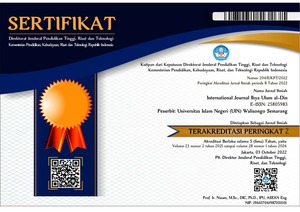KONSEP ADIL DALAM POLIGAMI: Telaah Pemikiran Mushthofa Al-‘Adawi dalam Tafsir Al-Tashïl Lita’wïl Al-Tanzïl
DOI:
https://doi.org/10.21580/ihya.17.1.1730Keywords:
Fair, Mushthafa al-‘Adawi, al-Tashil li Ta’wil al-TanzilAbstract
Poligamy has been a sensitive issue and a heated debate among ulamas, Muslim scholars, and interpreters of the Qur’an since a long time ago. There are three opinions on interpreting verses considered as the source of law on poligamy and which is written in the books of the Qur’anic exegeses. Firstly, the group of interpreters who allow poligamy absolutely and extremely flexible. Secondly, the group of interpreters who allow poligamy but under very strict requirements. Thirdly, the group of interpreters who reject and prohibit and even consider poligamy as an unlawful act for any reasons. Within such a context Shaykh Mushthafā al-‘Adawī wants to give a full explanation about the understanding on poligamy especially that is related to the concept of equality in the poligamy by interpreting qur’anic verses which are understood controversially by using the methode of interpreting the Qur’an with other verses of the Qur’an, sound narration, munāsabah al-ayāt (interralated quranic verses), and the context of the verse of poligamy itself.---
Poligami telah menjadi isu sensitif dan perdebatan sengit antara para ulama, ilmuwan Muslim, dan penafsir Alquran sejak dahulu kala. Ada tiga pendapat dalam menafsirkan ayat-ayat yang dianggap sebagai sumber hukum tentang poligami dan yang ada dalam kitab-kitab tafsir Alquran. Pertama, kelompok penafsir yang mengizinkan poligami dan sangat fleksibel. Kedua, kelompok penafsir yang mengizinkan poligami namun memiliki persyaratan yang sangat ketat. Ketiga, kelompok penafsir yang menolak dan melarang dan bahkan menganggap poligami sebagai tindakan melanggar hukum karena alasan apapun. Dalam konteks seperti itu, Syekh Mushthafā al-'Adawī ingin memberikan penjelasan lengkap tentang pemahaman poligami terutama yang berkaitan dengan konsep kesetaraan dalam poligami dengan menafsirkan ayat-ayat qur'an yang dipahami secara kontroversial dengan menggunakan metode untuk menafsirkan Qur'an dengan ayat-ayat Al Qur'an lainnya, narasi yang baik, munāsabah al-ayāt, dan konteks ayat poligami itu sendiri.
Downloads
References
‘Abduh, Muḥammad, Tafsīr al-Manār. Miṣr: Dār al-Manār, 1367 H.
Abdullah, Raihanah Hj., “Berpoligami: Antara Hak Suami dan Hak Isteri Menurut Undang-Undang Keluarga Islam di Malaysia”, Jurnal Syari’ah Vol 11, No. 2, 2003.
Al-‘Adawī, Muṣṭafā ibn. al-Tashīl li Ta’wīl al-Tanzīl, al-Manṣūrah: Dār al-Khulafā’, 2001.
Adenike, Adesehinwa Olayinka. “Effects of family type (monogamy or polygamy) onstudents’ academic achievement in Nigeria” International Journal of Psychology and Counselling, Vol. 5 (7), (Oktober 2013).
Al-Bukhārī, Abū ‘Abdillāh Muḥammad ibn Ismā‘īl. Ṣaḥīḥ al-Bukhārī. Beirut: Dār Ibn Kathīr, 2002.
Darwazah, Muḥammad ‘Izzat. al-Tafsīr al-Ḥadīth, al-Qāhirah: Dār Ihyā’ al-Kutub al’Arabiyah, 1383 H.
Esmaili, Ghasem. Sadrpushan, Najme. Gorji, Yousef. “Comparison of Life Quality for Men in Monogamy and Polygamy Families”. Interntional Journal of Sociological Research, Vol. 3, No.2, (2012).
Khaṭīb, ‘Abd al-Karīm. al-Tafsīr al-Qur’ān li al-Qur’ān, al-Qāhirah: Dār al-Fikr al-‘Arabiy, 1967.
Al-Maqdisī, Abū Muḥammad ‘Abdullāh ibn Aḥmad ibn Muḥammad Ibn Qudāmah al-Hanbalī, Al-Mughnī. Riyāḍ: Dār ‘Alam al-Kutub, 1997.
Al-Marāghī, Aḥmad Muṣṭafā, Tafsīr al-Marāghī. Miṣr: Sharikah Maktabah wa Maṭba‘ah Muṣṭafā al-Bābī al-Ḥalabī wa Awlāduhu, 1946.
Muharram, Tamyiz, “Kritik Konsep Poligami dalam Perspektif KHI Metodologi Syahrur”, al-Mawarid: Jurnal Hukum Islam, Jurusan Syari‘ah Fak. Agama Islam, UII Yogyakarta, edisi XV, 2006.
Mulia, Siti Musda, Islam Menggugat Poligami. Jakarta: PT. Gramedia Pustaka Utama, 2004.
Muslim, Abū al-Ḥusayn. Ṣaḥīḥ Muslim, Riyāḍ: Dār al-Ṭaiyibah, 2006.
Olsen, Nate. “Marriage and Divorce in Islamic and Mormon Polygamy: A Legal Comparison”, Intermountain West Journal of Relegius Studies, Volume 1, Number 1 (2009).
Al-Qāsimī, Muḥammad Jamāl al-Dīn. Tafsīr al-Qāsimī al-Musammā Maḥāsin al-Ta’wīl. Al-Qāhirah: Dār Iḥyā’ al-Kutub al-‘Arabiyah, 1956.
Shaltūt, Mahmud, al-Islām ‘Aqīdah wa Syarī‘ah. al-Qāhirah: Dār al-Shurūq, 1983.
Shaḥrūr, Muḥammad. al-Kitāb wa al-Qur’ān: Qirā’ah Mu‘āṣirah. Dimasq: al-‘Ahāli li al-Ṭibā‘ah wa al-Tawzī‘, 1990.
Shihab, M. Quraish, Membumikan al-Qur’ān. Bandung: Mizan, 1995.
Smearman, Claire A. “Second Wive’s Club: Mapping the Impact of Poliygamy in U.S Immigration Law”, Berkelay Journal of International Law, Volume 27, Issue 2, (2009).
Al-Ṭabarī, Abū Ja‘far Muḥammad ibn Jarīr. Jāmi‘ al-Bayān ‘an Ta’wīl al-Qur’ān, Tahqīqī Muḥammad Shākir. al-Qāhirah: Maktabah ibn Ṭaymiyah, tt.
Tahir, Masnun, “Hak-Hak Perempuan dalam Hukum Islam Keluarga Syiria dan Tunisia”, al-Mawarid: Jurnal Hukum Islam, Jurusan Syari‘ah Fak. Agama Islam, UII Yogyakarta, edisi XVIII, 2008.
Yasin, Raudlotul Firdaus Binti Fatah & Jani, Mohd. Shah. “The Positive Role of Polygamy in Reducing Women Socio-Related Problems in Malaysia”, American International Journal of Social Science. Vol 2 No. 3 (Mey, 2013).
Zuhayli, Wahbah, Tafsīr al-Munīr fi al-‘Aqīdah wa al-Sharī‘ah wa al-Manhaj. Beirut: Dār al-Fikr, 2009.
Sumber Online.
Muhammad Abduh, “Orang Teknik Mesin yang Jadi Ulama, http://ustadzaris.com/orang-teknik-mesin-yang-jadi-ulama. (Diakses, 9 September 2013).
www.youtube.com/watch?v=O-80GONw2hE
http://www.youtube.com/watch?v=1D3zsJiHjW0
http://www.youtube.com/watch?v=4tl4zPthpQM&noredirect=1
Downloads
Published
How to Cite
Issue
Section
License
By submitting an article to the journal, the author(s) agree to transfer the published article's copyright to the journal, which will act as the publisher. This means the journal will have the right to publish the article in various forms, including reprints. The journal will maintain the publishing rights to the published articles.
This work is licensed under Creative Commons Attribution-ShareAlike 4.0 International License.
In line with the license, authors and third parties (readers, researchers, and others) are allowed to share and adapt the material. In addition, the material must be given appropriate credit, provided with a link to the license, and indicated if changes were made. If authors remix, transform or build upon the material, authors must distribute their contributions under the same license as the original.



